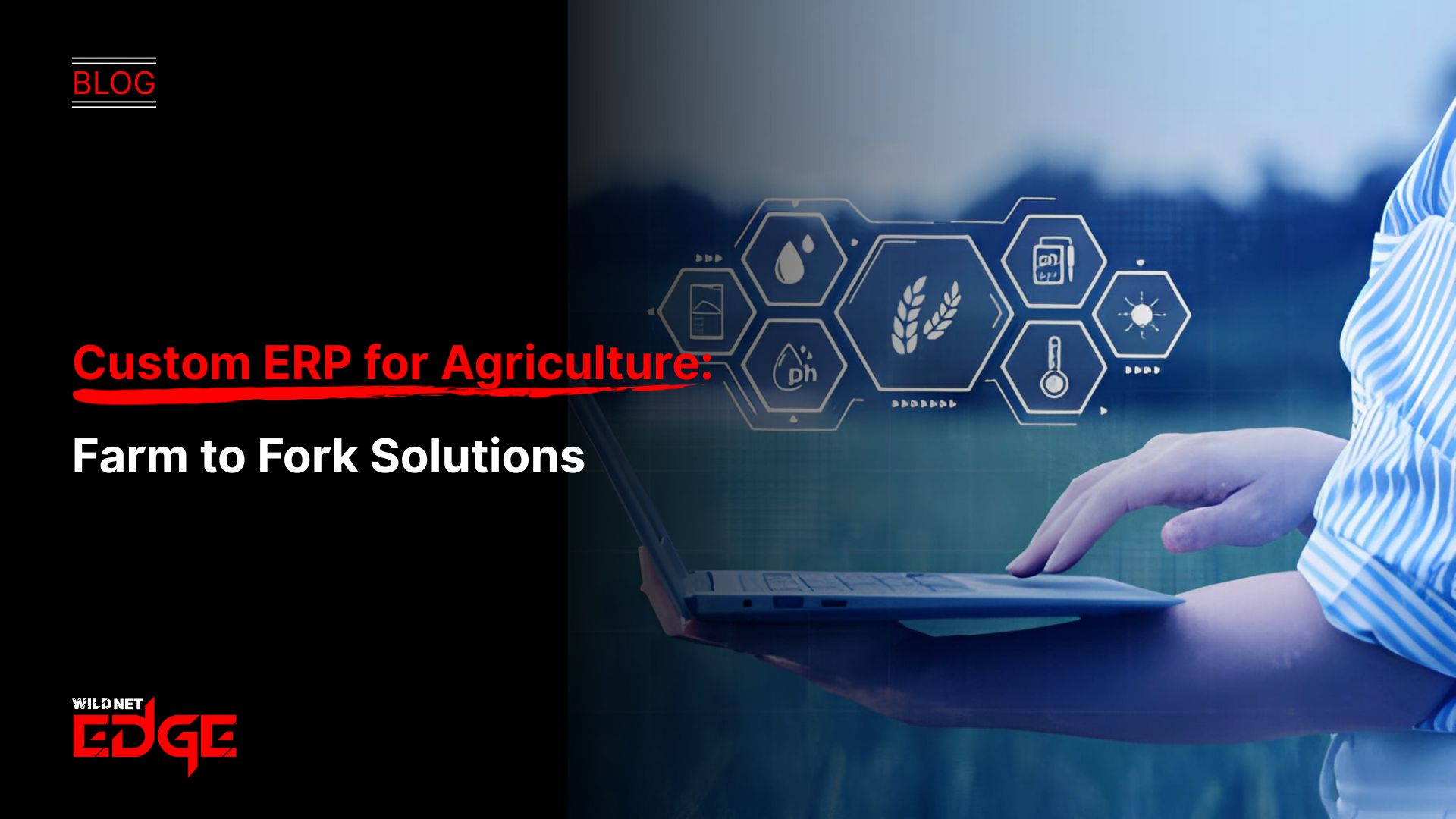TL;DR: This article discusses the critical role of a Custom ERP for Agriculture in modern farm management in 2026. It highlights that specialized ERP software is essential for overcoming complexity and chaos in the agri supply chain. The piece details key benefits, including increased efficiency and better profitability, by centralizing data, optimizing inventory, and leveraging cutting-edge tools like AI and IoT for proactive, data-driven decisions.
Managing a farm can be very hard. It involves more than just the growing and picking of crops. You handle the transportation, storage, and financial transactions. Scattered data is an issue faced by many farming companies. This scenario ends up using more resources than necessary and losing income. How wonderful it would be if you could have the whole picture at one glance!
The Game Changer: Agriculture ERP Software. Agriculture ERP software solution is the best. It is very energetic and, on the other hand, also not so much. The farming operations are hardly the same anymore. You handle everything very effectively. This includes plantations, workers, and deliveries to customers. A customized ERP system is the new age of farm managing.
Why Your Business Needs a Custom Agriculture ERP
You must move beyond basic systems. A custom ERP gives you total control.
Centralized Data for Better Decisions
Scattered data causes delays. A tailored ERP provides a single source of truth. All farm-related data is centralized. This lets you monitor crop health. You predict yields accurately. You manage weather risks easily. Informed decisions become proactive, not reactive.
Optimizing the Agri Supply Chain
The agri supply chain is complex. It runs from seeds to customers. Every link must be efficient. ERP software is indispensable here. It allows real-time tracking of inventory. It manages sales data and supplier information. This transparency means quick decisions. You can adjust production plans fast. This prevents waste and ensures you capitalize on market demand.
Scalability for Future Growth
Your farm will grow. A generic system won’t keep up. A Custom ERP for Agriculture is built to scale. You can add new modules as your business expands. It ensures your software evolves with your needs, not against them.
Key Benefits of Implementing a Custom ERP
A specialized ERP does more than organize. It directly boosts your core.
- Enhanced Efficiency and Cost-Effective
Automation saves time. The ERP automates resource utilization tracking. It manages labor schedules. This reduces human error. Lower error rates mean lower operational costs. You stop wasting seeds and fertilizer. - Superior Inventory and Resource Management
Inventory is your lifeline. The system helps you track seeds, fertilizers, and equipment. You know exactly what you have. You know when to replenish. This prevents costly overstock or damaging stockouts. You minimize waste. - Improved Compliance and Financial Reporting
Compliance can be critical. The ERP tracks regulations and standards. It generates detailed reports instantly. You see financial performance clearly. Strategic insight highlights areas for improvement. This leads to massive cost savings.
Custom ERP vs. Basic Farm Management Software
Both systems are positive. They help your farm. But they serve different levels of complexity.
| Service | Basic Farm Management System (FMS) | Custom ERP for Agriculture |
| Focus | Daily field activities and simple record-keeping. | End-to-end business integration from field to finance. |
| Data Scope | Crop health, planting, and harvesting data. | Integrates all FMS data with Financials, HR, and Supply Chain. |
| Customization | Limited; works for small, simple farms. | High; tailored to specific crop types, regional laws, and business goals. |
| Best For | Small, family-run operations need basic tracking. | Large-scale, complex commercial farms need total strategic control. |
Popular Technologies and Tools in Agriculture ERP
Modern farming is tech-driven. The best ERPs integrate cutting-edge tools.
| Category | Technology | How It Transforms Farm Management |
| Data Collection | Internet of Things Sensors | Sensors gather real-time data on soil health, moisture, and pest presence. |
| Analysis | Artificial Intelligence and Data Science | Algorithms analyze sensor data. They provide actionable insights for optimal irrigation and fertilization. |
| Accessibility | Mobile Access and Cloud Integration | Farmers manage operations from anywhere. Data sharing is real-time and seamless. |
| Security | Advanced Cybersecurity Measures | Protects massive amounts of sensitive data from cyber threats and ensures regulatory compliance. |
Case Studies
Real-world results show the power of custom ERPs.
Case Study 1: Optimizing Resource in Utilisation for a Large Grain Farm
Challenge
A large grain farm struggled with unpredictable fertiliser costs. Their inventory was managed manually. This led to $100,000s in waste and inefficient application.
Solution
We implemented an Agriculture ERP with integrated IoT and mapping modules. The system tracked soil nutrient levels instantly. It automatically adjusted fertilizer dispensing in real-time based on AI analysis.
Result
The farm reduced fertilizer waste by 28% in the first season. They achieved a 10% increase in yield prediction accuracy. The ERP turned waste into profit.
Case Study 2: Streamlining the Dairy Agri Supply Chain
Challenge
A regional dairy operation faced complexity in its agri supply chain. Milk collection, processing, and distribution logistics were chaotic. Delays caused product spoilage and customer dissatisfaction.
Solution
We provided a Custom ERP solution. It linked cow health records, milking schedules, processing plant inventory, and optimized truck delivery routes. All data was centralized in the cloud.
Result
The operation achieved 99.9% delivery on-time performance. They cut spoilage rates by 15%. The streamlined logistics boosted customer satisfaction and expanded their regional market reach.
CTA: Don’t let manual chaos limit your farm’s potential.Ready to Elevate Your Farm’s Operations? Partner with us. Request Your ERP Consultation Today!
Conclusion
Agriculture ERP software is a necessity. It is not a luxury. A custom solution enhances your farm management practices. It streamlines your agri supply chain. You increase efficiency, profitability, and sustainability.
Ready to get the edge? Partner with WildnetEdge. Our expert team specialises in tailored ERP solutions. We meet your farm’s specific needs for optimum performance. Reach out today.
FAQs
Q1: What is the difference between a Custom and a Generic ERP?
A generic ERP requires you to adapt your farm processes to the software. A Custom ERP for Agriculture is built specifically around your crops, regional laws, workflows, and unique business goals. It fits perfectly.
Q2: How does an ERP help with labor management on the farm?
The ERP tracks labor hours by field and task. It manages payroll. It also helps with compliance. This ensures fair scheduling and accurate cost allocation across projects.
Q3: Can ERP solutions help with agri supply chain management?
Yes, absolutely. ERP solutions facilitate real-time tracking and management of the agri supply chain. This ensures smoother logistics, better forecasting, and reduced waste from harvest to delivery.
Q4: How does AI integration actually help my fertilizer use?
AI algorithms analyze data from soil sensors (IoT). They recommend the exact amount of fertilizer needed for specific zones in a field. This optimizes the application, reducing overuse and saving money.
Q5: What features should I search for in agriculture ERP software?
You should focus on essential features like inventory management, real-time reporting, financial tracking, and highly customizable features specific to your agricultural sector.

Nitin Agarwal is a veteran in custom software development. He is fascinated by how software can turn ideas into real-world solutions. With extensive experience designing scalable and efficient systems, he focuses on creating software that delivers tangible results. Nitin enjoys exploring emerging technologies, taking on challenging projects, and mentoring teams to bring ideas to life. He believes that good software is not just about code; it’s about understanding problems and creating value for users. For him, great software combines thoughtful design, clever engineering, and a clear understanding of the problems it’s meant to solve.
 sales@wildnetedge.com
sales@wildnetedge.com +1 (212) 901 8616
+1 (212) 901 8616 +1 (437) 225-7733
+1 (437) 225-7733















 ChatGPT Development & Enablement
ChatGPT Development & Enablement Hire AI & ChatGPT Experts
Hire AI & ChatGPT Experts ChatGPT Apps by Industry
ChatGPT Apps by Industry ChatGPT Blog
ChatGPT Blog ChatGPT Case study
ChatGPT Case study AI Development Services
AI Development Services Industry AI Solutions
Industry AI Solutions AI Consulting & Research
AI Consulting & Research Automation & Intelligence
Automation & Intelligence















